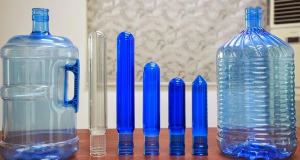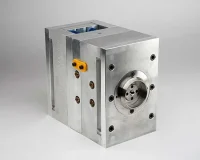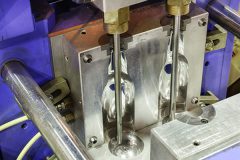The blow molding process is famous for producing hollow plastic elements like bottles and containers. However, despite its blessings, blow molding can present challenges. Knowing the everyday problems and how to restore them can save time and money. Here are 10 commonplace Plastic Blow Molding problems and their solutions.
10 Common Blow Molding Problems and Solutions
Uneven Wall Thickness
Problem:
Sometimes, the walls of the molded product are choppy, which can weaken the product in certain regions.
Solution:
To repair this, alter the die and parison thickness. You can also tweak the blow pressure to ensure even cloth distribution. Regular machine protection can also prevent this issue.

Flashing
Problem:
Flashing occurs when excess cloth is squeezed out along the edges of the mildew, leaving unwanted material on the product.
Solution:
To avoid flashing, make sure the mildew is successfully aligned. At some point in the moulding technique, consider reducing the temperature or strain. Adjusting those factors will limit excess fabric from leaking out.
Sink Marks
Problem:
Sink marks appear as small dips or depressions on the floor of the molded product. They occur when the material cools inconsistently.
Solution:
Increase the cooling time or reduce the mildew temperature. Ensure the fabric waft is clean and that there’s even pressure. This will assist the product in cooling evenly and decrease sink marks.
Air Bubbles or Voids
Problem:
Air bubbles or voids, which form when air is trapped inside the cloth, could make the product look flawed or susceptible.
Solution:
To prevent this, boost the mould’s temperature to permit better fabric flow with the flow. Also, increasing the blow pressure ensures that air escapes well. Good venting in the mold is likewise essential.
Poor Surface Finish
Problem:
A rough or uneven floor finish can affect the appearance and quality of the final product.
Solution:
Polish the mould frequently to ensure it’s clean and smooth. For an extra constant floor finish, consider regulating the temperature and stress settings.
Parison Curl
Problem:
Parison curl occurs when the extruded parison curls up instead of staying directly. This could make the final product choppy or distorted.
Solution:
To fix the parison curl, modify the extrusion temperature. Lowering the temperature can help the parison keep its form. Test the die design to ensure the fabric is easy to go with the flow.
Blistering
Problem:
Blistering appears as raised spots on the product’s floor. It regularly results from excessive warmth.
Solution:
Reduce the temperature of the mildew or modify the blow time. Ensuring that the cloth cools nicely before elimination can also help avoid blistering.
Poor Weld Lines
Problem:
Weld lines occur whilst fabric flows meet but don’t fuse nicely. This weakens the product.
Solution:
Increase the blow stress to help the cloth fuse higher. You also can increase the temperature to permit the substances to bond extra efficaciously. Mold layout also plays a role in ensuring that the cloth flows meet effectively.
Product Deformation
Problem:
Deformation occurs when the product loses its shape after removal from the mould.
Solution:
Ensure the cooling time is adequate before eliminating the product. Lowering the mold temperature and blow stress can also help hold the product’s form.

Inconsistent Weight
Problem:
Sometimes, the load of the products can vary from piece to piece. This is a commonplace trouble when manufacturing conditions alternate.
Solution:
Keep the mould temperature, extrusion pace, and strain constant. Regular gadget protection and calibration will also help ensure uniform weight across all merchandise.
Which is the best Blow Molding manufacturer in China?
EX MOULD Co. is the best manufacturer of custom Blow Moulding in China. Founded in 2006, EX MOULD has earned a reputation for producing splendid custom injection molding solutions. The agency is a trusted supplier inside the industry, recognized for its advanced technology and skilled crew. They offer various products, including blow molding, which ensures unique and durable products.
With a solid commitment to innovation, EX MOULD Co. sets excessive requirements in blow molding manufacturing: their modern-day device and willpower to client delight cause them to have a pass-to desire for global businesses.
FAQs
What are the reasons for choppy wall thickness in blow molding techniques?
Uneven wall thickness is usually caused by improper die settings or inconsistent blow strain. Adjusting these settings can help the fabric distribute evenly.
How can I save you flashing all through Injection Blow Molding?
Flashing can be decreased by ensuring the mildew is aligned effectively and adjusting the temperature and stress settings.
Why do sink marks seem on blow-molded merchandise?
Sink marks appear when the material cools inconsistently. You can repair this by increasing the cooling time or reducing the extrusion Blow Molding temperature.
Final Thoughts
Blow molding is complicated, but knowledge and addressing typical problems can improve product quality. By monitoring device settings, regularly maintaining the device, and ensuring proper material waft, you can avoid these issues and convey top-notch Blow Molding Machine merchandise.



